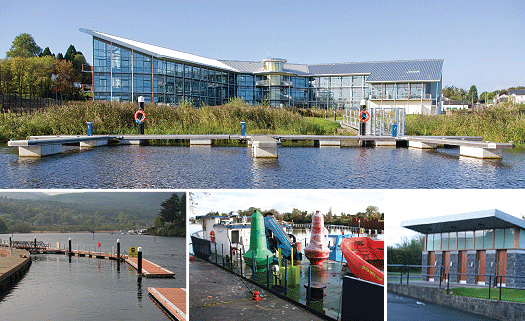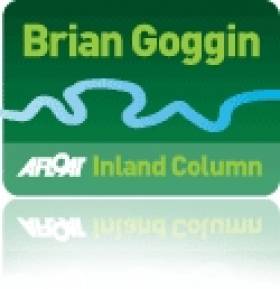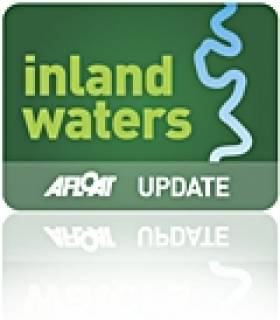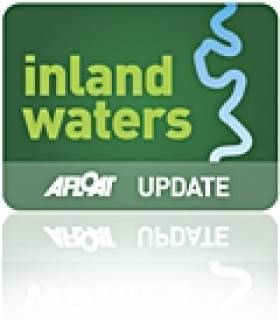Displaying items by tag: John Martin
Waterways Ireland CEO John Martin's Achievements
#inland waterways – John Martin, Chief Executive of Waterways Ireland, was due to retire in March 2013, but is staying on until his successor arrives. This is an opportune moment to look at his achievements.
The definition of Irish waterways has been altered several times since the end of commercial carrying about fifty years ago. They ceased to be part of a transport system but the structures still needed to be maintained, so waterways became an engineering activity, with a side order of tourism. Then Michael D Higgins seized both the initiative and the waterways, shifting them to the Heritage Service.
But the prospect of Peace In Our Time brought about a further redefinition in 1999. The assignment of waterways to a new Cross-Border Implementation Body, under the Good Friday Agreement, could be seen as anything from a step towards a united Ireland (to be welcomed or resisted depending on your politics) to a "sensible rationalisation of a waterways network" [Coakley et al 2006]. That network was now explicitly stated to be primarily for recreational purposes, and it was to be managed by a new cross-border "body".
Setting up a new organisation is not an easy task at any time. It's much harder when the context is so new, and the politics so delicate, that the organisation can't be described as anything more specific than a "body"; when you have to merge staff from large and small organisations; when you're operating across national boundaries with two legal systems, two currencies and two sets of employment law; when you have to add new functions like accounting and marketing.
Waterways Ireland has done all of that, and done it against an intensely political background, where the organisation's very existence is a political statement. It has reported to ministers in two jurisdictions, ministers whose positions may vary with the political affiliation of the incumbent. That is in addition to the usual pressures from politicians anxious to promote their own pet projects (or those of their supporters) and to the possible problems of operating in constituencies with very different political complexions.

Main image: Waterways Ireland HQ at Enniskillen (courtesy Waterways Ireland), From left: New moorings and walkway at Killaloe, Inis Cealtra with buoys in Tarmonbarry, Service block at Enfield on the Royal Canal.
There have been some problems, but fewer than might have been predicted. In a context where mere survival might have been an achievement, Waterways Ireland has gone well beyond that. It was, admittedly, lucky in being able to take advantage of the late Celtic Tiger, but it made good use of the funding. The waterways are probably better equipped now than at any time since the Shannon Commissioners ceased their work, with excellent infrastructure, user facilities and capital equipment — as well as a splendid headquarters building in Enniskillen.
Perhaps more importantly, WI has brought about its own redefinition of the waterways. It has widened the range of recreational activities and drawn attention to that range. It has succeeded in attaching its own identity to the waterways, making it clear that they are managed entities, and it is now exerting control over certain areas where laxity has been the norm.
All of this adds up to a tremendous achievement. It has required work from the civil servants in the two Government departments, north and south, and the staff of the North-South Ministerial Council, as well as from politicians in both jurisdictions, but above all it reflects the hard work of the staff of Waterways Ireland, the senior management and, in particular, the retiring Chief Executive, John Martin. He has had the thanks and good wishes of politicians on all sides in the Northern Ireland Assembly and he deserves the same from all waterways users.
Waterways Ireland Welcomes European Strategic Partners
Waterways Ireland is facilitating Masterclasses in Dublin and Enniskillen from the 14-15 September 2011 for the 17 EU partners involved in the Waterways Forward INTERREG IVC Project. The Waterways Forward project is focused on the 'enhancement of the management and the boosting of socio-economic development of regional inland waterways and their adjacent waterways' right across Europe.
The Masterclasses will address issues around the sustainable development of inland waterways and the potential impact of climate change on regional inland waterways across Europe. Welcoming the partners to Dublin in advance of the Masterclasses, Waterways Ireland Chief Executive, John Martin stated;
"The INTERREG IVC Project has recognised the unexploited economic resource of regional inland waterways in Europe and the potential contribution that they make to tourism development, economic growth and quality of life. Waterways Ireland is delighted to be a partner in this innovative project. I welcome our 16 partners not only to engage with them in the strategic work of the Masterclasses in developing the way forward for Europe's regional waterways but intend to also share with them the unique attributes of Ireland's inland waterways"
Lead by the Dutch Recreational Waterways Foundation, the INTERREG IVC Project runs from January 2010 to December 2012 and has a total budget of just over €2.8 million. The Masterclasses are one of a series of meetings, conferences and research projects being undertaken by the partners with the aim of sharing best practice, developing integrated, tailor made governance structures & models and facilitating increased cooperation at EU level.
Dublin Canal Developments Approved
The Minister for Community, Equality and Gaeltacht Affairs, Pat Carey T.D., today announced the approval of the granting of leases for a number of proposed developments on Dublin's canals on the inland waterways.
The developments include the construction of a cycle bridge across the Royal Canal at Spencer Dock, a boardwalk along the Grand Canal at Leeson Street and a pedestrian/cycle bridge across the Grand Canal at Lynches Lane.
The decision to grant leases to Dublin City Council and South Dublin County Council for the proposed developments was taken at a meeting of the North South Ministerial Council in Armagh this morning. Speaking after the meeting, Minister Carey said the decision to approve the leases had the potential to further transform Dublin's waterways for the benefit of the citizens of Dublin.
Minister Carey said, "Developments like those proposed by Dublin City Council will add to the regeneration of the city and will strengthen the environmental, social and economic fabric of the capital. They will add to the quality of life of all and especially to the quality of life of pedestrians and cyclists."
John Martin, Chief Executive of Waterways Ireland, the cross-border body charged with the all-island promotion and development of waterways is delighted that the Ministers have approved the granting of the leases at the NSMC.
He said "Waterways Ireland is happy to facilitate the development of these waterside amenities in the Dublin Area. We hope to work with all the local authorities on many projects in the future right across the Dublin Region."































































